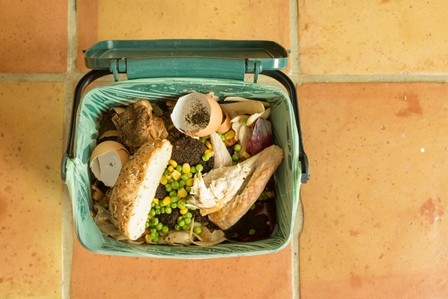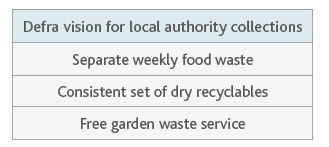Defra has set out its aim for every household in England and many businesses to have a weekly separate food waste collection in place from 2023.
The measure – which is subject to consultation – is laid out in the environment department’s Resources and Waste Strategy, published this morning (18 December) – which will also seek to promote consistency of recycling services among local authorities.
The consultation will also explore whether households with gardens should have access to free garden waste collections – with an apparent implication that councils could be moved in the direction of offering free garden waste services if they don’t already [updated] .
“New duties will be assessed to account for new burdens, and funded appropriately,” Defra has stated.
Food waste
According to the strategy, UK households produce around 7 million tonnes of food waste each year, of which 5 million tonnes is categorised as “still edible,” with 2 million tonnes being inedible, requiring treatment through the waste system.
The document states that while some local authorities in England operate food waste recycling schemes, the majority of food waste ends up in residual waste.
And, the strategy sets out Defra’s aim of working towards eliminating food waste to landfill by 2030.
Councils
Cost pressures have seen some councils shy away from weekly food waste collections, and funding for any steps to push councils towards service changes is likely to be key to the successful rollout of the measure.
Councils will also be keen for support in convincing residents to use existing services, which is not explicitly mentioned in the strategy.
However, the measure has seen support from other industry bodies, including the Renewable Energy Association.
Extending separate food waste collections to more households should increase recycling and composting rates by about 5 percentage points, the strategy estimates, which have plateaued at close to 45% in recent years.
And, the document states that anaerobic digestion (AD) represents “the best environmental outcome for food waste that cannot be prevented or be redistributed”.
Consistent

Defra wants every household in England to have a weekly separate food waste collection in place from 2023
In addition to separate food waste collections, Defra is looking to require the collection of a consistent set of dry materials from all households and businesses. A consultation is due to be launched in early 2019.
The strategy states: “For various reasons, including uncertainty about quality, lack of information and high costs when collections are inconsistent, the benefits of using recycled materials are not fully realised at present.”
And, to support higher levels of recycling by local authorities Defra will also consult on introducing non-binding performance indicators for the quantity of materials collected for recycling and minimum service standards for recycling.
Voluntary agreements
Aside from local authorities, since 2007, the government said it has approached the problem of food waste through a series of voluntary agreements that have reduced per capita food waste by 14%. The latest agreement, the Courtauld Commitment 2025, aims to reduce per capita UK food waste by a further 20%, between 2015 and 2025.
Further to this, the government will set up a pilot scheme to reduce food waste, supported by a £15 million – previously announced by Michael Gove (see letsrecycle.com story). The pilot scheme will be developed in collaboration with businesses and charities and will launch in 2019/20.
Going forward, Defra has announced plans to consult on annual reporting of food surplus and waste by food businesses and on seeking legal powers for food waste targets and surplus food redistribution obligations.
This will form the basis for a consultation in 2019 on introducing regulations to make reporting mandatory for businesses of an “appropriate size” and seeking powers for mandatory food waste prevention targets for appropriate food businesses and for surplus food redistribution obligations to be introduced.
And, Defra will promote awareness of food waste by appointing a new ‘food surplus and waste champion’ – who will work with business leaders on the issue.
The National Food Waste Conference
27 March 2019
Cavendish Conference Centre, London
http://www.foodwasteconf.com/
The post Strategy: Defra sets out food waste actions appeared first on letsrecycle.com.
Source: letsrecycle.com Waste Managment



